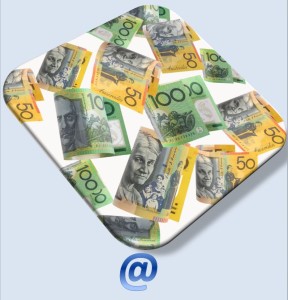I hope you find my writing and business tips and observations useful. My business and blog are dedicated to helping businesses communicate clearly and reach their potential.
Read, subscribe to my newsletter, enjoy!Tash
Winning despite poor template use
I may soon be $5,000 richer.
Then again, I may not be as I know my chances of winning a competition are somewhat less than 100%!
Reading the competition terms…
I just entered a competition, after looking through the terms. I don’t read the terms in full but I always check if there are unexpected uses of my email address before I give it to someone.
In this case, adding me to a single mailing list was acceptable so I entered.
However, I also noted a few things in the terms that were silly.
I think they have used a generic set of competition terms, adding in a few specific details but leaving everything else as it was in the template. To me, this looks like they were too lazy to bother writing or editing their terms.
Let’s assume they had permission to use that template rather than breaching copyright by copying someone else’s terms. They could still face legal issues if something in the template doesn’t apply to their current situation – like how winners are notified.
Dubious terms
To enter, I gave my name and email address – no postal address or phone number.
According to the terms, if I win, I will be ‘contacted by phone and email’. Interesting idea given they don’t have my phone number…
A single prize of $5,000 is on offer to the winner. Yet, ‘the prize… is not transferable as cash.’
This competition is ‘only open to everyone worldwide…’ The use of only and everyone doesn’t quite work – presumably it makes more sense for competitions where ‘only open to customers’ or ‘only open to Australian residents’. A quick read of the completed sentence could have shown the wisdom of deleting ‘only’.
[Tweet “Not editing a template to use it appears lazy.”]
Have you ever seen someone use a template without thinking to update all the relevant details in it?
Was the result funny or did it damage the business’ reputation (or both!)?
Make it clear what you do
What does your business do? Would I be able to answer that question after reading your website or brochure?
You may be surprised that many businesses do not clearly state what they don on their website. Some just assume everyone knows, others try to be clever and use fancy words and others appear to like being mysterious and/or aloof. And that’s not counting those sites that try to tease and get your details before they really disclose anything – I just can’t trust that sort of site.
Why do I think it is important to be clear about what you do?
- make life easy for your potential clients – clarity saves them guessing or searching for the information
- using the appropriate words (i.e. keywords) will help search engines find and rank you
- save yourself being contacted by people who are after something you don’t offer
- it builds credibility – you are open and honest rather than trying to be impressive
Some people argue that effectively hiding information throughout the site means people have to read more pages to find their answers (for example the home page, about us page and services page to find out if you offer what hey want). My answer to that is that many people won’t bother and will look elsewhere, and even if they do, is wasting a client’s time showing them much respect or valuing them at all?
So how can you make this clear?
- add an informative tagline to every page of your site
- make it the first sentence on your site for real clarity
- use commonly accepted words to describe your services at least once – if you use unusual terms by choice, perhaps simplify it on your about us page
- have a list of your services if there could be doubts. For instance, a beautician might list she offers waxing, facials and manicures but not pedicures and a legal firm might list they do contracts, employment agreements, family law and business advice (the implication being they don’t do criminal law)
- note who you service. My tagline is ‘for all your business writing needs’ which clearly shows I write for businesses rather than writing fiction or being a journalist
- be specific “we help people” doesn’t say much but “we help homeowners prepare for sale” and “we help families care for their elderly loved ones” are much more informative (to humans and search engines)
So maybe look at your materials again and think about whether you are clearly stating what you do.
SMARTY goals
As promised in my New Year’s message, I wanted to explain what SMARTY goals are – and why they are better than other goals.
SMARTY Goals are:
Specific
Measurable
Achievable
Relevant
Timed
whY
And now for an explanation…
Specific – the more specific the goal, the easier it is to see your progress and feel some achievement. For example, ‘loosing weight’ or ‘getting fit’ may be common resolutions, but they aren’t specific. Much better to say ‘I will lose 5 kilos’ or ‘I will train so I can run 10km’
Measurable – make it so you know when you have reached it, and see improvement along the way as well. For example, ‘I will make $x more this year than last year’ is easy to see how close you are to $x and achieving your goal.
Achievable – you must be able to work on the goal. Setting a goal of running a marathon next week is unlikely if you currently get puffed walking to the letterbox, but a goal of walking for 10 minutes every day is achievable. Of course, part of being able to work on the goal means your attitude, too – you need to be willing to work on it and allow yourself to grow your abilities along the way.
Relevant – your goals must fit in with where you are, what your values are and your big life goals. Following someone else’s goals may not be relevant for you (e.g. don’t try to lose weight if you are underweight), and you may need to set different goals at different times in your life. If your values are to help people, then ‘I will volunteer at the community centre 3 hours a month’ is a relevant goal.
Timed – goals without a deadline are just wishes really. A deadline makes you take them more seriously and to act on them now rather than tomorrow. Deadlines need to be realistic to keep your goal achievable, but they also need to be tight enough to keep you motivated and working towards the goal. So a timed goal is something like ‘I will read a business magazine a month’, ‘I will sell 10% more this year’, ‘I will exercise 4 times a week’ or ‘I will lose 6kg by 1 August’.
whY– you need to have a reason to aim for your goal. The reason will keep you going even when it is hard and you don’t seem any closer to the end. And I’m talking about the real, deep reason for your goal. For example, ‘my doctor says I should stop smoking’ will only motivate you on a good day. On a bad day, you will need to know ‘I want more energy and don’t want emphysema like Uncle Jim so I will not light a cigarette now’. So what is your real reason (and there can be more than one) for setting this goal?
So let’s go back to our first examples – I want to lose weight and I want to get fitter. Now, let’s word them as SMARTY goals:
I will lose 1 kilo a month until I reach 60kg so I can fit into my favourite dress and keep up with my kids in the park.
I will exercise four times every week to be fit enough for the fun run in September. I want to show John that I can compete at his level and I want to feel proud of myself.
So what are your SMARTY goals for the next six months?



Recent Comments